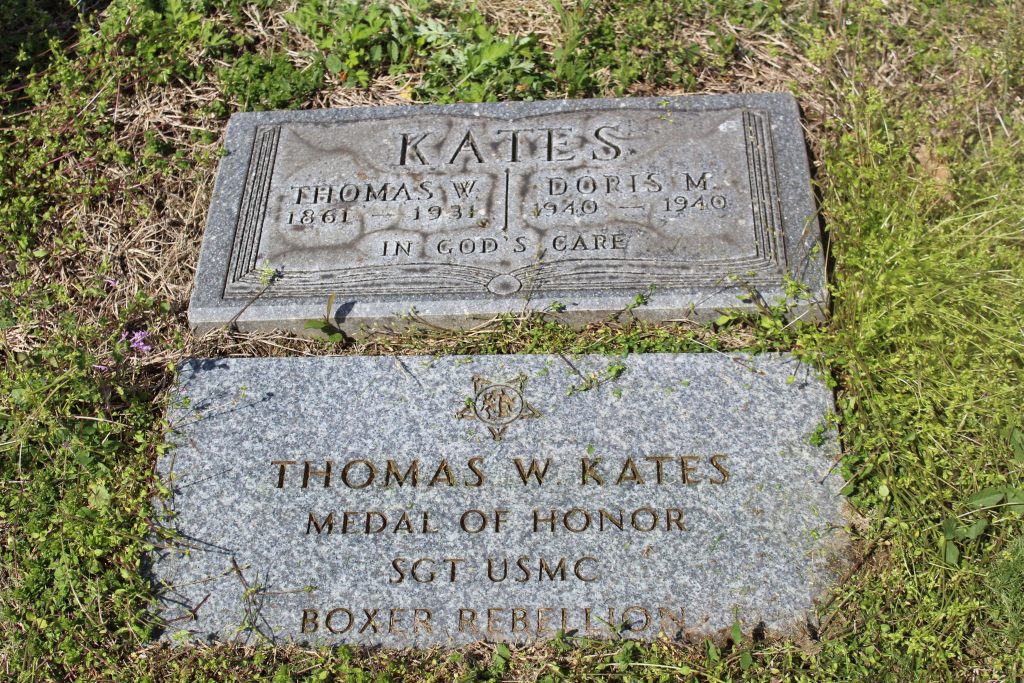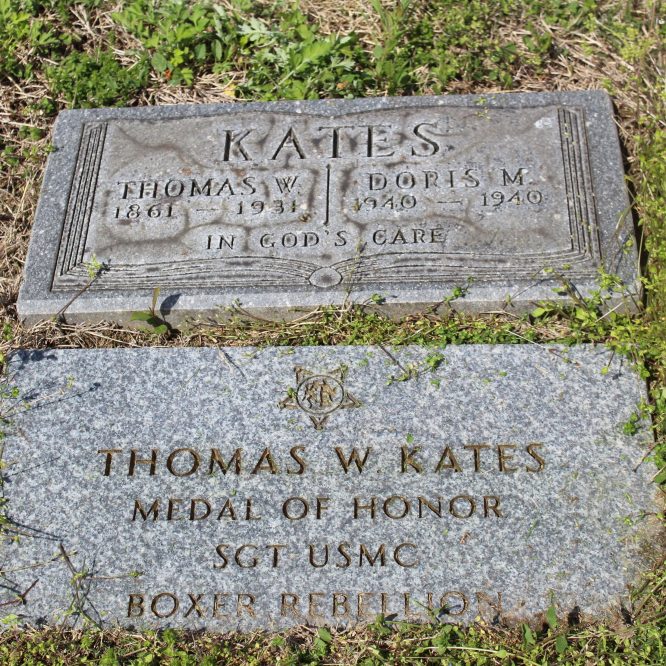
Vol. 5, No. 25
According to the Congressional Medal of Honor Society, nearly 3,500 soldiers have received the Medal of Honor since its inception in 1862. Of those medals awarded, nearly half served with the Union Army during the Civil War. Between the conclusion of the American Civil War and World War One, 765 men received the medal, the largest number serving during the Indian Campaigns (426) and the smallest number serving in the Dominican Campaign (3) during the U.S. occupation of the Dominican Republic from 1916 to 1924. Of those 756 medals, 33 were awarded to Marines serving during the Boxer Rebellion, a nearly two-year uprising led by the Yihetuan (or Boxers) against foreign imperialists in China. Thomas Wilbur Kates, a native of Orleans County, was one of those men who received the Medal of Honor for his actions during this uprising.
Born on May 7, 1865 at Shelby, Thomas was the son of English immigrants Charles and Mariah Caple Kates. Charles worked as a currier (tanner) at LeRoy in the 1850s and later relocated his family to Orleans County before the birth of their youngest son Thomas. The family remained in the area for a short period of time before relocating to Buffalo sometime before 1870. At that time, the family was enumerated in the 1870 U.S. Federal Census in Buffalo’s Third Ward with his parents, his brothers Charles and Walter, and sister Lottie. Tom Taber’s “The Orleans Battery: A History of the 17th New York Light Artillery in the War of Rebellion” confirms that the elder Charles Kates enlisted with the Orleans Battery on August 22, 1862, at Medina, New York; he was 38 years old.
On July 21, 1899, Thomas Kates accepted enlistment with the U.S. Marine Corps at New York City. Nearly six feet tall with blue eyes, brown hair, and ruddy complexion, Pvt. Kates was stationed in the Philippine Islands from September 15, 1899 to June 17, 1900 for the initial part of his enlistment. As the result of the United States’ Open Door Policy in China combined with the ongoing influence of Christian missionaries in the region, the Boxers began to resist against imperialist and foreign influences, culminating in Empress Dowager Cixi’s declaration of war against all foreign influences.
Thomas Kates and other Marines were dispatched to China on June 18, 1900, where they remained through October 10, 1900. According to his citation, Kates was awarded the Medal of Honor “…for extraordinary heroism while serving with the 1st Regiment (Marines), in action in the presence of the enemy during the advance on Tientsin, China, 21 June 1900. Private Kates distinguished himself by meritorious conduct.”
With a little digging, more information about Kates’ meritorious conduct came to light. The Boxers believed that they were invulnerable to foreign weapons and laid siege to the “Legation Quarter” where United States, British, French, German, Italian, Japanese, and Russian troops were stationed at Tientsin (Tianjin). The location became a refuge for foreigners and Chinese Christians amidst the threat of violence. As legation forces defended the compound with small arms fire, three machine guns, and one muzzle-loaded cannon, a contingent of U.S. Marines under the command of Major Littleton Waller marched toward Tientsin as reinforcements. With eight officers and 132 men, accompanied by 400 Russians, the group marched unopposed until 7 o’clock in the morning when the unit was hit with small arms fire from the flank. U.S. sharpshooters quickly quelled the attack.
Within minutes, 1,500 to 2,000 entrenched Boxers commenced firing from the front and flanks. As fighting continued the Russian retreated and formed a line approximately ½ mile behind the Marines, exposing the men to fire from all sides. As the Russians continued to retreat, the Marines followed suit while suffering the continued onslaught of the Boxers; the entire retreat lasted four hours. By 2 o’clock in the afternoon, the Marines had returned to bivouac having marched a total of 30 miles and suffering thirteen casualties.
Maj. Waller wrote in a letter dated July 6, 1900, that “…of the men I wish to say, while all in the engagements we participated in, behaved in such a manner as to bring forth the highest praise from the foreign officers…Cpl. Thomas W. Kates.” He continued, “…the specifically distinguished of these being Corporal Kates and Privates Campbell and Francis, with the Colt gun.” According to the Report of the Commandant of the U.S. Marine Corps dated September 29, 1900, these three men remained with Lt. Powell, holding a position with an M1895 Colt-Browning Machine Gun until all but Campbell and Powell were gunned down. They destroyed the gun to prevent it from entering enemy hands before they commenced their retreat. Although it does not show up on his service record, Maj. Waller noted that Kates was slightly wounded, and Pvt. Francis was wounded in the hand. All three were later awarded the Medal of Honor for their actions during this advance.
Kates’ record does show that he was present for the Battle of Tientsin on July 13th and 14th of 1900, the Battle of Yangun on August 6, 1900, and the Battle of Peking on August 14th and 15th of 1900. This record indicates that Kates was wounded on July 13, 1900 but makes no mention of the slight wound received on June 21st. The record concludes with Kates’ desertion at New York City on May 19, 1903 after his return from the Philippine Islands in June of 1902. This desertion is likely why no newspaper articles mentioned this important award at the time of his death on May 6, 1931. Kates was buried at Flushing Cemetery in Queens County, New York.

